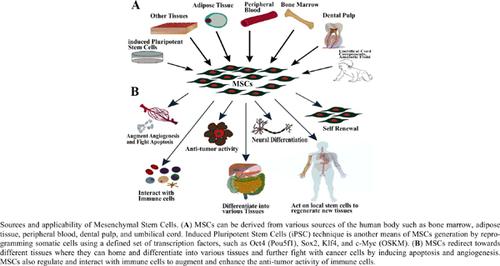Current Pharmaceutical Biotechnology ( IF 2.2 ) Pub Date : 2021-01-31 , DOI: 10.2174/1389201021666200907121530 Mohammad Saeedi 1 , Muhammad S Nezhad 2 , Fatemeh Mehranfar 3 , Mahdieh Golpour 4 , Mohammad A Esakandari 5 , Zahra Rashmeie 3 , Maryam Ghorbani 3 , Fatemeh Nasimi 3 , Seyed N Hoseinian 3

|
Mesenchymal Stem Cells (MSCs), a form of adult stem cells, are known to have a selfrenewing property and the potential to specialize into a multitude of cells and tissues such as adipocytes, cartilage cells, and fibroblasts. MSCs can migrate and home to the desired target zone where inflammation is present. The unique characteristics of MSCs in repairing, differentiation, regeneration, and the high capacity of immune modulation have attracted tremendous attention for exerting them in clinical purposes, as they contribute to the tissue regeneration process and anti-tumor activity. The MSCs-based treatment has demonstrated remarkable applicability towards various diseases such as heart and bone malignancies, and cancer cells. Importantly, genetically engineered MSCs, as a stateof- the-art therapeutic approach, could address some clinical hurdles by systemic secretion of cytokines and other agents with a short half-life and high toxicity. Therefore, understanding the biological aspects and the characteristics of MSCs is an imperative issue of concern. Herein, we provide an overview of the therapeutic application and the biological features of MSCs against different inflammatory diseases and cancer cells. We further shed light on MSCs' physiological interaction, such as migration, homing, and tissue repairing mechanisms in different healthy and inflamed tissues.
中文翻译:

间充质干细胞的生物学特性和临床应用:您需要意识到的关键特征
间充质干细胞(MSCs)是一种成年干细胞,具有自我更新的特性,并且有可能专门化为多种细胞和组织,例如脂肪细胞,软骨细胞和成纤维细胞。MSC可以迁移并归巢到存在炎症的所需目标区域。MSC在修复,分化,再生和高免疫调节能力方面的独特特征吸引了人们的极大关注,因为它们在组织再生过程和抗肿瘤活性中发挥了重要作用。基于MSCs的治疗方法已显示出对各种疾病(如心脏和骨骼恶性肿瘤以及癌细胞)的显着适用性。重要的是,基因工程化的MSC作为一种先进的治疗方法,通过半衰期短,毒性高的细胞因子和其他药物的系统性分泌,可以解决一些临床障碍。因此,了解MSC的生物学方面和特性是当务之急。在此,我们概述了MSC对不同的炎症性疾病和癌细胞的治疗应用和生物学特性。我们进一步阐明了MSC在不同健康和发炎组织中的生理相互作用,例如迁移,归巢和组织修复机制。我们提供了MSC对不同炎症性疾病和癌细胞的治疗应用和生物学特征的概述。我们进一步阐明了MSC在不同健康和发炎组织中的生理相互作用,例如迁移,归巢和组织修复机制。我们提供了MSC对不同炎症性疾病和癌细胞的治疗应用和生物学特征的概述。我们进一步阐明了MSC在不同健康和发炎组织中的生理相互作用,例如迁移,归巢和组织修复机制。









































 京公网安备 11010802027423号
京公网安备 11010802027423号